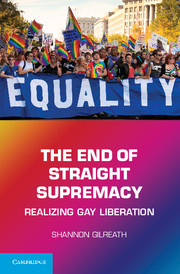2 - Law/Morality
Thoughts on Morality, Equality, and Caste
from Part I - Equality and Making Meaning
Published online by Cambridge University Press: 05 June 2012
Summary
In this chapter, I proceed from the premise that contemporary equality theory does not work for Gay people. I critique equal protection theory, specifically arguing that the current jurisprudence, with its focus on trait immutability, suspect class/classification analysis, and tiered levels of scrutiny, is improperly restrictive of the Constitution’s equality norm and generally unproductive for Gay advocacy, and, in any event, is not good, or specifically with regard to immutability analysis, not even settled, law. Consequently, I shift equal protection analysis to focus on state action, omission, and complicity in the perpetration and perpetuation of caste-based disadvantage.
This analysis sees trait immutability, a serious stumbling block to many Gay equality claims, as irrelevant to equal protection, which ought properly to prohibit the marginalization of a citizen or group of citizens when that marginalization is based only on the merely descriptive moral disapproval of an identity trait – immutable or otherwise – by majoritarian society, and dispenses with the tiered classification system and its corresponding levels of scrutiny, as well as with the intentionality threshold that marks the entrance to contemporary equal protection. The analysis begun in this chapter is continued in the subsequent chapter’s analysis of Lawrence v. Texas. The caste understanding of equal protection theorized here becomes the substantive equality alternative to the Lawrence Court’s privatized-liberty analysis, and it is the basis of my theorizing throughout this book.
- Type
- Chapter
- Information
- The End of Straight SupremacyRealizing Gay Liberation, pp. 33 - 70Publisher: Cambridge University PressPrint publication year: 2011



